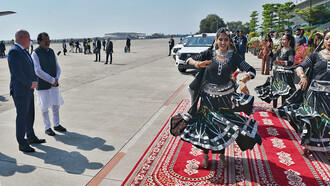The Israel-Gaza conflict is a longstanding and complex issue that has deep historical roots and continues to provoke intense debate and emotions on both sides. At its core, the conflict revolves around competing claims to territory, security concerns, and a lack of mutual recognition and trust between the parties involved. Understanding the dynamics of this conflict requires examining its historical background, underlying causes, recent developments, and the challenges to achieving a lasting peace.
Historical context
The roots of the Israel-Gaza conflict can be traced back to the late 19th and early 20th centuries when waves of Jewish immigration to Palestine, then part of the Ottoman Empire, began to increase. With the rise of Zionism, a movement advocating for the establishment of a Jewish homeland in Palestine, tensions between Jewish and Arab communities escalated.
The British Mandate period (1917-1948) further exacerbated tensions as both Jewish and Arab nationalist movements sought to assert their claims to the land. The 1947 UN Partition Plan proposed the division of Palestine into separate Jewish and Arab states, but the plan was rejected by Arab leaders, leading to the Arab-Israeli War of 1948 and the establishment of the State of Israel.
The occupation of Gaza
The Gaza Strip, a narrow coastal enclave bordering Israel and Egypt, came under Egyptian control following the 1948 war. During the Six-Day War in 1967, Israel captured the Gaza Strip, along with the West Bank, East Jerusalem, and the Golan Heights, effectively occupying these territories. While Israel withdrew its settlers and military forces from Gaza in 2005, it maintains control over the territory's borders, airspace, and maritime access, effectively imposing a blockade on the region. The blockade, along with periodic military incursions and clashes, has led to widespread humanitarian suffering and economic hardship for Gaza's residents.
Triggering factors
The Israel-Gaza conflict has been marked by cycles of violence, often triggered by specific events such as rocket attacks from Gaza into Israeli territory, retaliatory airstrikes by the Israeli military, clashes at the Gaza-Israel border fence, or tensions surrounding access to religious sites in Jerusalem, particularly the Al-Aqsa Mosque compound.
In recent years, the issue of Palestinian political division between the rival factions of Fatah, which governs the West Bank, and Hamas, which controls Gaza, has further complicated efforts to resolve the conflict. The lack of a unified Palestinian leadership with whom Israel can negotiate has hindered diplomatic progress and perpetuated the cycle of violence.
International responses
The Israel-Gaza conflict has garnered significant international attention and condemnation, with calls for both sides to exercise restraint and respect international law. The United Nations, regional organizations, and individual countries have repeatedly called for a peaceful resolution to the conflict based on the principles of international law, including the recognition of Israel's right to exist alongside a viable Palestinian state. However, efforts to broker a lasting ceasefire and advance the peace process have been hampered by deep-seated mistrust, ideological differences, and geopolitical considerations. The United States, traditionally a key mediator in the Israeli-Palestinian conflict, has faced criticism for its perceived bias towards Israel, particularly under the Trump administration.
Challenges to peace
Achieving a durable peace between Israel and Gaza faces numerous challenges, including:
1. Security concerns
Israel cites security threats from militant groups in Gaza, such as Hamas and Islamic Jihad, as justification for its military actions and blockade. Meanwhile, Palestinians in Gaza argue that the blockade and military incursions only deepen their sense of insecurity and despair.
2. Settlement expansion
The expansion of Israeli settlements in the West Bank, considered illegal under international law, remains a major obstacle to the establishment of a contiguous and viable Palestinian state. The issue of settlements has been a point of contention in peace negotiations and has fueled tensions on the ground.
3. Political divisions
The lack of Palestinian unity and the ongoing rivalry between Fatah and Hamas undermine efforts to present a unified front in negotiations with Israel. Reconciliation between the two factions and the formation of a unity government remain elusive goals.
4. Humanitarian crisis
The humanitarian situation in Gaza, exacerbated by the blockade and recurrent conflicts, continues to deteriorate, with widespread poverty, unemployment, and inadequate access to essential services such as healthcare and education. Addressing the humanitarian crisis is essential for building trust and creating the conditions for peace.
The Israeli government must finish the conflict and war with the people of Palestine. It is time that both countries resolve the issue, and let innocent citizens live in peace. One cannot gain peace by murdering the citizens of Gaza. Thousands of children, women and men are dead in Israel's war on Gaza. For how long will mankind continue to suffer, and the world leaders keep a blind eye on the current situation?















